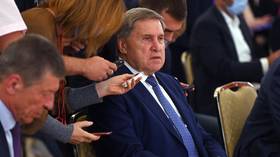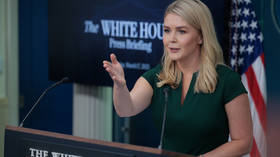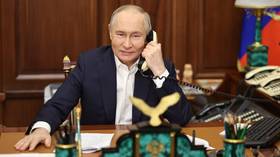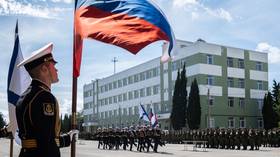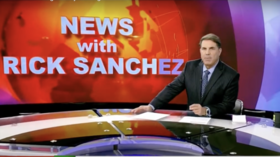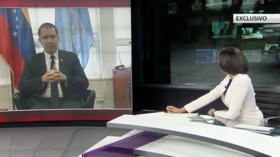Smoke & mirrors: US uses Russia as excuse for desire to abandon INF, analysts say
Washington’s announcement of a six-month suspension of the Intermediate-Range Nuclear Forces (INF) Treaty is nothing but an attempt to make the US look good while it dismantles a pillar of global security, experts told RT.
The US Secretary of State Mike Pompeo declared on Friday, February 1, that the US had suspended its participation in the landmark INF Treaty, which had served as one of the cornerstones of European security since the last years of the Cold War. While making his statement, the top American diplomat dedicated most of his speech to blaming Russia for this supposedly forced decision and spared no words while describing what he called Moscow’s “brazen” and “shameless” disregard for its commitments under the accord.
The INF Treaty, which was initially signed by the US and the USSR to denuclearize the European continent, bans ground-based missiles with a range between 500km and 5,500km – plenty of which had been deployed by both sides of the Cold War at that time.
However, all these statements coupled with an ultimatum delivered to Russia and a pledge to return to compliance with the treaty on condition that Moscow fulfills Washington’s demands are nothing but smoke and mirrors, experts believe. What the US really wants is to keep an image of a ‘good guy’ while deliberately damaging the international arms control system and putting its allies in the line of fire.
US 'language of ultimatums' shows that the decision on INF withdrawal was taken by US administration long ago - Russian officials https://t.co/nU3kTfqMrs
— RT (@RT_com) 1 февраля 2019 г.
“The US seeks to play down the impression from the treaty withdrawal … and pretends that the ball is in Russia’s court,” Leonid Ivashov, a retired general and the president of the Academy for Geopolitical Problems, told RT. Washington is “well aware” that Russia cannot in fact do anything as it did not violate the treaty, still, it acts as if “it was left with no choice” but to withdraw from the INF accord, he added.
Ivashov, who was a high ranking officer with the Russian Main Intelligence Directorate (GRU), explained that any problems related to alleged non-compliance with such sorts of treaties are usually solved at an expert level and do not require any involvement of “political establishment.” In this case, however, the US raised the issue precisely at the political level.
“One side demonstrates the missiles and … presents the [missile] tests results” while the other side sends a team of inspectors to verify their counterparts’ compliance with the treaty, Ivashov said, adding that both the USSR, and then Russia, and the US did it in the past.
Also on rt.com US seeks to protect hegemony by leaving INF Treaty but will only put itself in peril – expertsNow, Russia took an extraordinary step and staged a public display of the missiles, which the US claimed were violating the INF Treaty. The journalists, who attended the presentation, were not just provided with characteristics of the missile, which is still in development, by the Russian military but were also given a chance to see the parts of the missiles, which were displayed in their containers, and inspect their launcher. Neither the US nor any of its NATO allies attended the presentation, though.
Instead, Andrea Thompson, under secretary of State for arms control and international security, recently said that literally nothing would convince the US that Russia complies with the treaty, except for the destruction of all the missiles of a certain type, which are now in development.
Arms Race 2.0? US production of nuclear warhead starts days before INF withdrawal pic.twitter.com/423sdNixCn
— RT (@RT_com) 30 января 2019 г.
The approach the US took in this case shows that it does not want to keep the treaty despite all the official rhetoric from Washington, Ivashov believes. Instead, the US pursues its own narrow interests and probably even seeks to divert attention from its own INF Treaty violations, the retired general noted.
Russia has long expressed its concerns about the US missile defense systems deployed to Europe and particularly to Romania. The facilities there host the AEGIS Ashore systems – the land-based version of the US Naval ABM system that uses a launcher compatible with intermediate-range Tomahawk cruise missiles.
“We do have suspicions that it might be intermediate-range missiles and not missile defense systems” that are stationed there, Ivashov said, adding that, “under normal circumstances,” the US would have let Russian inspectors examine the facilities but it refused in this case.
Also on rt.com Trump says NATO allies fully support US suspending obligations under INFAnother problem the US has to deal with as it leaves the landmark agreement is the concerns of its own allies in Europe. Back in the time of the Cold War, when the US intermediate-range missiles were deployed to Europe before the INF Treaty was signed, the Western Europeans were scared by the Soviet missile arsenal, Vladimir Batyuk, a senior fellow with the Moscow-based Institute of the USA and Canada, explained.
Now, the Europeans see the new Russian missile type as a reason to hold negotiations but not to scrap a treaty, Batyuk told RT. What the Europeans really want is “not to become targets for a Russian preventive strike,” he said, adding that they are apparently reluctant to let Washington deploy new missiles on the European soil. Whipping up hysteria around Russia’s alleged violations of the INF Treaty might well help the US change their opinion. At least, NATO already backed the US decision to suspend its participation in the treaty.
Russia is in material breach of the #INFTreaty & must use next 6 months to return to full & verifiable compliance or bear sole responsibility for its demise. #NATO fully supports the US suspension & notification of withdrawal from the Treaty: https://t.co/VOhUB0HoAdpic.twitter.com/28Rwicqr8o
— Jens Stoltenberg (@jensstoltenberg) February 1, 2019
The western experts, meanwhile, do not hide the fact that Washington does want to scrap the agreement, which, according to them, is “completely obsolete.” Although, at least some of them tend to point the finger at China as they explain the reasons for such a move.
“The primary reason the US should withdraw from the INF Treaty is because the People's Republic of China, Iran, and the DPRK are not signatories to it,” Gregory R. Copley, the president of the International Strategic Studies Association, told RT, adding that while the US’ hands were tied by the treaty China, Iran and North Korea as well as other nations were “free … to develop weapons and deploy them to the disadvantage of the US.”
“The US has recently come to a…conclusion that…China is not constrained by the treaty and it is unfair,” Maxwell Downman, a nuclear policy analyst with the British American Security Information Council told RT, adding that the US National Security Advisor John Bolton has been “hammering out” at it since at least 2011.
Meanwhile, US President Donald Trump said on Friday he actually wants to work out some new arms control agreement. His proposal loosely resembles the idea of amending the INF Treaty instead of scrapping it – something that Russia already suggested but the US was reluctant to consider.
“I hope that we're able to get everybody in a big and beautiful room and do a new treaty that would be much better. Certainly, I would like to see that,” Trump told reporters at the White House. It, however, remains to be seen what Trump’s vision of a “much better treaty” would entail.
If you like this story, share it with a friend!



